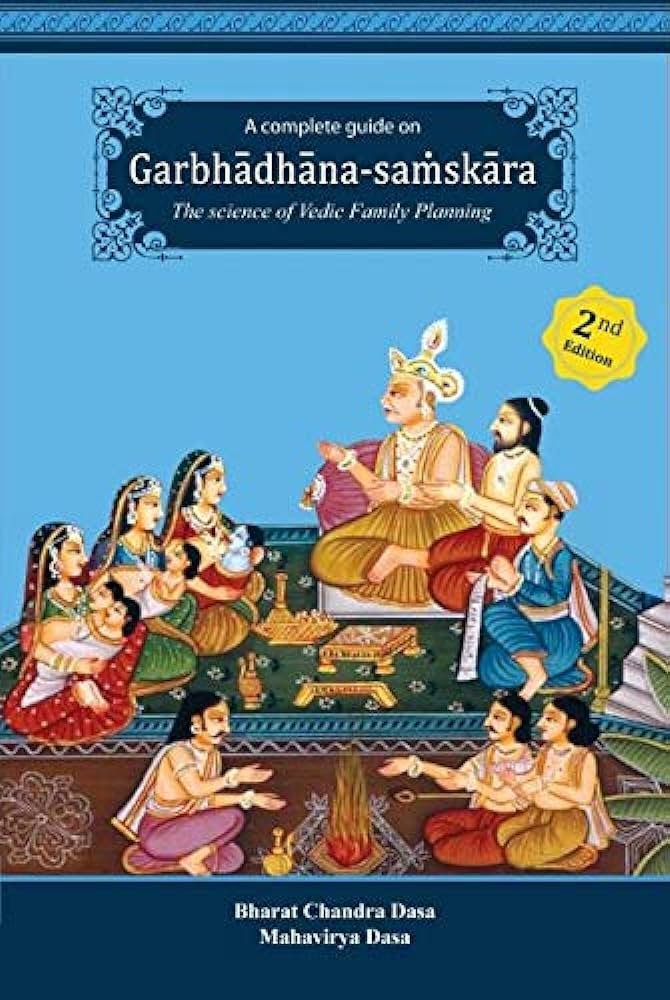Table of Contents
What is Garbh Sanskar?
Garbh Sanskar, one of the 16 prescribed sanskars for human beings, holds immense importance. It significantly benefits the physical development and brain growth of the fetus. In essence, Garbh Sanskar entails educating the child from the moment of conception.
Various religious rites are advised to ensure the comprehensive education and health of the child from the onset of pregnancy. Adhering to these practices constitutes Garbh Sanskar. Throughout history, society has placed great significance on Garbh Sanskar. Recent research and modern medical science are beginning to acknowledge its importance.
When should we start Garbh Sanskar?
Although your baby’s brain development begins right after conception and she can only respond to sound, light, and touch at around the fourth month. So, you can choose to start practicing Garbh Sanskar in the 4th month of your pregnancy. But it’s best to check with your doctor before practicing Garbh Sanskar and according to Ayurveda, through Garbh Sanskar, your baby can sense your thoughts and feelings along with outside influences like music and noise. So, there’s no compulsion that you must wait until the fourth month to start practicing it.
You can begin with simple practices right from the beginning of your pregnancy, as they may help you stay calm and positive throughout the journey. If you have any concerns related to practicing Garbh Sanskar, consult with your doctor for the right assistance.

5 reasons, for why you should do Garbh Sanskar?
Garbh Sanskar is a traditional practice that offers various benefits for both the mother and the unborn child. Here are five reasons why you should consider practicing Garbh Sanskar:
- Enhanced Bonding: Garbh Sanskar practices, such as talking, reading, or singing to the unborn baby, can enhance the emotional bond between the mother and the baby. This early bond can be beneficial for the baby’s emotional development and can foster a deeper connection post-birth.
- Emotional and Psychological Health: The practice emphasizes the importance of positivity and emotional well-being. Positive thoughts and a stress-free environment for the mother are believed to impact the mood and behavioral disposition of the child, promoting a happier and calmer baby.
- Stimulation of Development: Introducing gentle sounds, like classical music or the soothing sounds of certain instruments like the veena or flute, is said to stimulate the baby’s brain development. This auditory stimulation can enhance the baby’s listening abilities and cognitive development.
- Improved Sleep Patterns: The calm and serene environment promoted by Garbh Sanskar practices can help in regulating the baby’s sleep patterns. A well-rested baby grows healthy and is more manageable and responsive.
- Cultural and Spiritual Growth: Garbh Sanskar also includes spiritual activities like meditation, yoga, and chanting, which not only help maintain physical health and emotional balance but also imbue cultural values and spirituality from an early stage of life.
Practicing Garbh Sanskar can be a rewarding experience, fostering a nurturing environment for both the mother and the baby throughout the pregnancy.
What is positive impact on child of Garbh Sanskar
Garbh Sanskar, an ancient Indian practice, is believed to have multiple positive impacts on an unborn child, affecting their physical, emotional, cognitive, and spiritual development.
- Physical Development: The practice encourages a healthy lifestyle and nutrition for the expecting mother, which is crucial for the proper growth and development of the fetus. Regular physical activity, like prenatal yoga, ensures good health and well-being of both the mother and the child, facilitating optimal fetal development.
- Cognitive Development: Garbh Sanskar promotes the stimulation of the baby’s senses through exposure to soothing sounds such as classical music or the soft tones of a flute or veena. This auditory engagement is thought to enhance neural development and improve the baby’s auditory processing capabilities, potentially leading to better cognitive functions after birth.
- Emotional Health: By maintaining a calm and positive atmosphere, Garbh Sanskar helps in creating a peaceful prenatal environment. This serenity is believed to pass on to the child, helping in developing a calm and balanced temperament. Emotional wellness of the mother during pregnancy also plays a critical role in reducing prenatal and postnatal anxiety in the child.
- Spiritual Connection: The practice includes spiritual activities like mantra chanting and meditation, which not only foster a deep emotional bond between the mother and the child but also instill a sense of spiritual well-being and peace.
- Cultural Imprint: Garbh Sanskar allows parents to impart cultural values and a sense of identity to the unborn child through the use of language, music, and spiritual practices. This early exposure helps inculcate familial and cultural bonds from the beginning of life.
Overall, Garbh Sanskar is believed to prepare the unborn child for a healthier, emotionally stable, and spiritually enriched life, giving them a foundational advantage in terms of development and well-being.
Benefits of Garbh Sanskar
There are many benefits to Garbh Sanskar. The bonding between a fetus and mother begins with the development of the baby’s brain, and the baby in the uterus starts learning from the mother.
The health of the mother greatly impacts the unborn baby. The positive thinking and good mood of the woman benefit both her body and the fetus.
It positively affects the baby’s development. For example, the melodious tunes of the veena, flute, etc., are beneficial for the child. This accelerates the child’s brain and character development and positively affects the mind. Other benefits include the baby sleeping well and responding better during breastfeeding.
What to read for Garbh Sanskar?
- Garbh Sanskar: A Pilgrimage Within by Dr Archana Shukla

Click on this link to buy this book Garbh Sanskar: A Pilgrimage Within
2. Garbhadhana Samskara: The Science of Vedic Family Planning by Bharat Chandra Dasa and Mahavirya Dasa

Click on this link to buy this book Garbhadhana Samskara: The Science of Vedic Family Planning
3. Beginning of Motherhood by Dr. Rohit Dhingra (Author), Fleme Varkey (Editor), Pankhuri Purwar (Illustrator)

Click on this link to buy this book Beginning of Motherhood
4. Garbh Sanskar – You Reap What You Sow (base on Ayurveda) by Devangi Jogal

Click on this link to buy this book Garbh Sanskar – You Reap What You Sow (base on Ayurveda)
Talking to the baby in the womb (Garbha Vidya) – Ancient wisdom for modern mothers by Andal Bhaskar

Click on this link to buy this book Talking to the baby in the womb (Garbha Vidya)
Ayurvedic GarbhaSanskar : The Art and Science of Pregnancy

Click on this link to buy this book Ayurvedic GarbhSanskar
Which Foods You Shouldn’t Eat During Your Pre-Planning Pregnancy and Pregnancy
During pre-planning pregnancy and pregnancy, it’s essential to be mindful of your diet to ensure the health of both the mother and the developing baby. Here are some foods to avoid or limit during pre-planning pregnancy and pregnancy:
- High-Mercury Fish: Certain fish, such as shark, swordfish, king mackerel, and tilefish, contain high levels of mercury, which can harm the developing nervous system of the fetus. It’s advisable to avoid these fish during pre-planning pregnancy and pregnancy. Instead, choose low-mercury options like salmon, shrimp, catfish, and trout.
- Raw or Undercooked Seafood: Raw or undercooked seafood, including sushi, sashimi, oysters, and clams, may contain harmful bacteria and parasites that can cause foodborne illnesses. It’s best to avoid these foods during pre-planning pregnancy and pregnancy to reduce the risk of food poisoning.
- Raw or Undercooked Meat and Eggs: Raw or undercooked meat, poultry, and eggs may also harbor harmful bacteria such as Salmonella, E. coli, and Listeria, which can pose risks to both the mother and the baby. Ensure that meat and eggs are cooked thoroughly before consumption.
- Unpasteurized Dairy Products: Unpasteurized dairy products, including certain soft cheeses like Brie, Camembert, feta, and blue cheese, may contain Listeria bacteria, which can cause miscarriage, stillbirth, or severe illness in newborns. Opt for pasteurized dairy products to reduce the risk of Listeria contamination.
- Excessive Caffeine: High levels of caffeine consumption have been associated with an increased risk of miscarriage and low birth weight. Limit your intake of caffeinated beverages like coffee, tea, and soda during pre-planning pregnancy and pregnancy. It’s generally recommended to consume no more than 200-300 milligrams of caffeine per day.
- Alcohol: Alcohol consumption during pre-planning pregnancy and pregnancy can harm the developing fetus and increase the risk of birth defects, developmental issues, and miscarriage. It’s best to avoid alcohol entirely during this time.
- Raw Sprouts: Raw sprouts, including alfalfa, clover, radish, and mung bean sprouts, may be contaminated with harmful bacteria such as Salmonella and E. coli. It’s advisable to avoid raw sprouts during pre-planning pregnancy and pregnancy or ensure they are thoroughly cooked before consumption.
- Highly Processed or Unhealthy Foods: Limit the consumption of highly processed foods, sugary snacks, and foods high in saturated fats and trans fats. Instead, focus on a balanced diet rich in fruits, vegetables, whole grains, lean proteins, and healthy fats to support optimal health during pre-planning pregnancy and pregnancy.
Always consult with your healthcare provider or a registered dietitian for personalized dietary recommendations during pre-planning pregnancy and pregnancy based on your individual health status and dietary preferences.
Thank you

